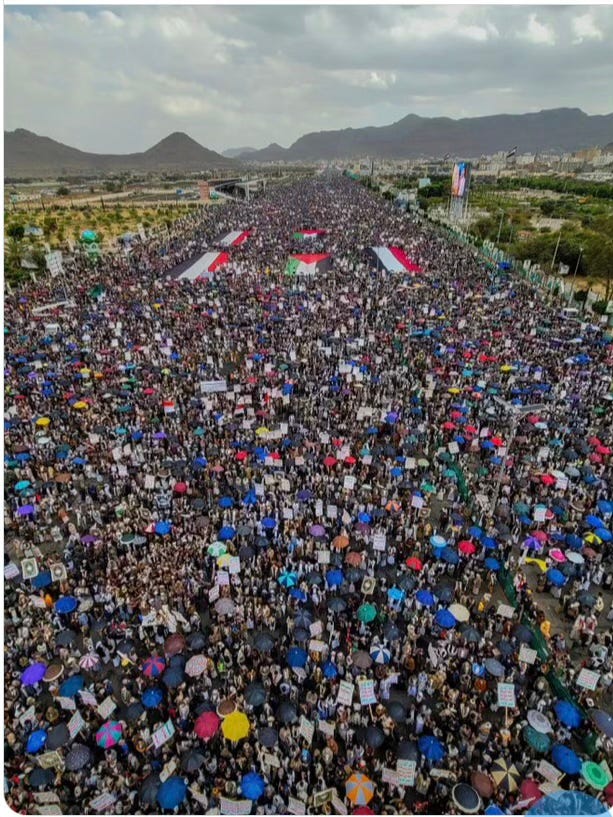The U.S. went to war this week, at the hands of a so-called "Peace Maker," Donald Trump
President Donald Trump, who says he can't stand all the deaths in Ukraine, is now responsible for his own killings in Yemen.
ONE MILLION YEMENIS MARCH on March 30, 2025
One million Yemenis, who support the Houthis, rallied on Eid al-Fitr, in Sana’a and most of Yemen, in celebration of the end of Ramadan, when Islamic people fast for a month.
Yemen is a Middle Eastern country, just slightly smaller than France. The Houthis control most of the country. Other parts of Yemen are controlled by al-Qaeda and by the previous government. Their political orientation is religious and nationalist, that includes a strong militant and sympathetic solidarity with its brothers and sisters in Palestine.
The official name of the movement is Ansar Allah (supporters of God). The Houthis are a Zaydi Shia Islamist group. They are an armed group that controls most parts of Yemen, including the capital, Sana’a, as well as some of the western and northern areas close to Saudi Arabia.
In 1990, Ali Abdullah Saleh (1990–2012), became president. In 2012, his position during the Arab Spring movement became shaky, causing him to resign. He is now working with the Houthis. He was succeeded by Abdrabbuh Mansur Hadi, who ruled for 10 years, and is now working with the neighboring country of Saudi Arabia, which has a warlike disposition toward Yemen,
Prior to the unification of South and North Yemen in 1990, South Yemen, which was officially named the People's Democratic Republic of Yemen, existed from 1967 to 1990 as the only socialist state in the Middle East and the Arab world. North Yemen was a capitalist state that was friendly to the United States. After 1990, the North dominated the new state, however, many leaders and politicians from the South found places where they could exert political power.
No one knows what the character of the future state of Yemen will be. It’s militant position vis-a-vis its past may be a predictor that Yemen will play an active role in the Middle East as a whole. One thing is certain. It will play a strong role in mobilizing other states to contend with Israel’s role in Gaza, the West Bank and elsewhere.
Saudi Arabia has been fighting to regain Hadi’s (the second president of the unified state) rule for the last three years, with U.S. help. The most powerful in Yemen, currently, are the Houthis who are supported by the former President Saleh.
The U.S. has supplied weapons in support of the Saudi war against the Houthis, culminating in two nights of bombing this week which took the lives of 53 adults and children. Another 100 Yemenis have been injured.
The hostility between the Saudis and the U.S. on one side and the Houthis on the other has been due to Israel’s relentless attacks and genocide against the Palestinians in Gaza. The Houthis have been interdicting shipping bound for Israel. The Yemenis suspended their attacks when a ceasefire was declared in Gaza. When the ceasefire fell apart, the Houthis resumed their attacks on Israel-bound shipping.
The Houthis say they recently fired two "Palestine-2 hypersonic ballistic missile" at Israel, targeting locations such as Ben Gurion Airport and the Nevatim Air Base. Hypersonic missiles travel at Mach 5, or five times the speed of sound. Until this announcement, it was assumed that only high-tech countries were capable of using such weapons. If, in fact, the Houthis possess such rockets, it could change the dynamics of the war in the Middle East. The Houthis are not the “barbarians,” that Trump says they are.

How would the Houthis gain possession of such sophisticated weapons? U.S. “experts” would blame it on Iran. However, this belies Yemen, or at least, South Yemen’s history. Before the fall of the Soviet Union, Yemen was on friendly terms with the socialist bloc. At that time, students from all over the world attended universities in Moscow. Many of these universities specialized in mathematics, engineering, chemistry and physics.
Those students are probably too old to play active roles in today’s fighting. However, they are not too old to teach and to encourage their children and grandchildren to become involved in the struggle against international capital. Not everyone, especially in the Global South, wants to be a stock broker or an entrepreneur.
If Yemen is typical of today’s emerging countries like North Korea, Laos, Nepal, and many countries in Africa and Latin America, it is going to be tough sledding for Trump's bullying. It might be best to try to get along with our fellow nations.




